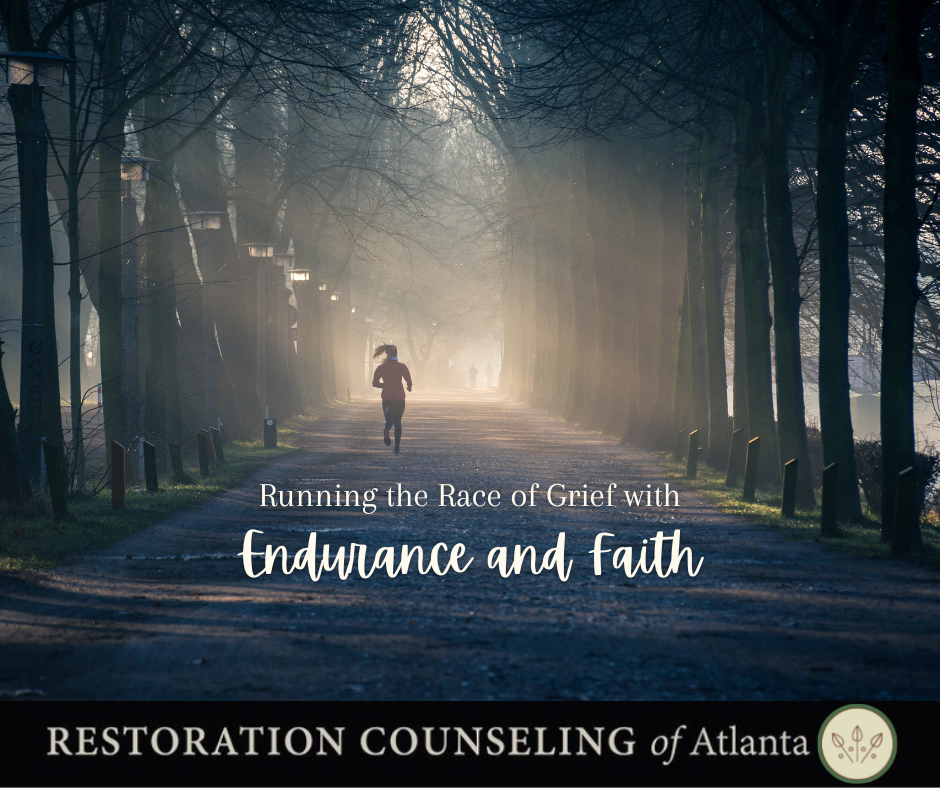Running is one of my favorite hobbies. I’m not an accomplished athlete, just an average runner who enjoys the structure and consistency of a running routine. The Peachtree Road Race, which I participate in each year on the 4th of July, is anything but an easy run. With its hills, heat, and packed course, it demands more than just endurance. It requires wisdom, pacing, and a willingness to push through discomfort. This year (2025), as I navigated the course, I couldn’t help but notice the parallels between running and the journey of grief.
No Shortcut Through Grief
At the start of the race, one thought kept echoing in my mind: I just want to be at the finish line. But then it hit me—I wouldn’t reach the finish line without running the full 6.2 miles. There’s no shortcut, no way around it. Grief is much the same. You can’t bypass the pain or find a fast track through the heartache. The only way through is one faithful step after another.
The first half of the Peachtree is deceptively smooth, mostly downhill. It’s easy to go out too fast, caught up in the momentum and excitement. But the second half is where the real test begins. The hills arrive, your body begins to tire, and you realize the journey has just begun.
This year, I’ve been walking alongside several clients carrying the heavy weight of grief. Their losses vary—a loved one, a marriage, a relationship, even a sense of identity. And just like a road race, grief cannot be rushed. It must be faced one mile, one step, at a time.
The stages of grief, introduced by Dr. Elisabeth Kübler-Ross—denial, anger, bargaining, depression, and acceptance—aren’t boxes to check off. They are places we cycle through, often repeatedly, as we process pain. Much like the hilly Peachtree course, grief often feels like one step forward, two steps back, through highs and lows, with no clear timetable.
When Grief Slows the Pace
Mile 4 of the Peachtree is known for its steep incline, historically called “Cardiac Hill.” But this year, it bore a new name: Hope Hill. That simple renaming resonated deeply with me. In the midst of life’s uphill climbs, Christ offers strength and hope for the journey. How did I make it up Hope Hill? One step at a time. And that’s how we move through grief. When the pain feels unapproachable and the sorrow overwhelming, God doesn’t ask us to finish it all at once. He simply invites us to take the next faithful step.
Isaiah 40:31 says, “But those who hope in the Lord will renew their strength. They will soar high on wings like eagles; they will run and not grow weary. They will walk and not faint.” This promise doesn’t minimize pain. It assures us that we will have the strength to endure it.
Just when I thought the hills were behind me, mile 5 surprised me with another set of inclines. I had to slow down and walk for a moment—to catch my breath and gather myself. Grief is similar. It calls for grace: grace to feel deeply, to rest without guilt, and to let go of the pressure to heal on a timeline. When another unexpected wave of sorrow crashes in, you’ll have the strength to face it—not because you’ve mastered grief, but because the Lord has carried you through before. His past faithfulness builds present resilience, and He will sustain you again, just as He always has.
Moving Forward with Hope
The final stage of grief, acceptance, isn’t a finish line that erases the loss. It’s the place where you begin to rebuild and step into a new reality. The hard miles have shaped you, stretched you, and brought you to a deeper dependence on the One who “is close to the brokenhearted” (Psalm 34:18).
Grief is a long and often wearying race, but we were never meant to run it alone. Support may come through a caring family member, a trusted friend, or even a compassionate therapist. And above all, we are never without Jesus—the “author and perfecter of our faith”—who has already walked this path before us. Because of Him, Hope Hill is not an impossible climb. It stands as a powerful reminder that with God’s steady presence, each step is filled with purpose. And the finish line? It’s not the end, but the start of something new.
 Written by: Becky Philo
Written by: Becky Philo
becky@restorationcounselingatl.com; 678-534-3824, ext.121
Becky Philo (Roswell) is a Master’s Level Therapist with specialized trauma therapy training, including a certificate in Trauma-Focused CBT. She enjoys working with individuals and couples in challenging life seasons. Becky has been married to her husband for 33 years, and they have four adult daughters. With a person-centered approach to therapy, Becky offers a calm and accepting presence for teens, individual adults, and couples with issues including depression, anxiety, marriage and parenting challenges, interpersonal matters, and trauma. Becky also enjoys working with premarital couples and is a certified Prepare Enrich Facilitator.

